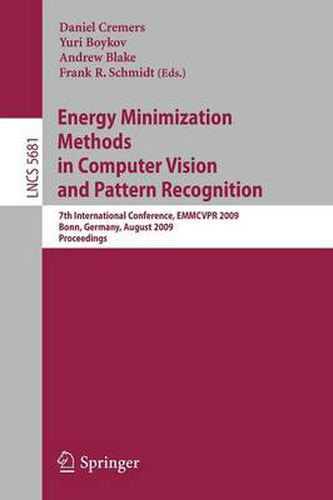Readings Newsletter
Become a Readings Member to make your shopping experience even easier.
Sign in or sign up for free!
You’re not far away from qualifying for FREE standard shipping within Australia
You’ve qualified for FREE standard shipping within Australia
The cart is loading…






This title is printed to order. This book may have been self-published. If so, we cannot guarantee the quality of the content. In the main most books will have gone through the editing process however some may not. We therefore suggest that you be aware of this before ordering this book. If in doubt check either the author or publisher’s details as we are unable to accept any returns unless they are faulty. Please contact us if you have any questions.
Overthelastdecades,energyminimizationmethods havebecomeanestablished paradigm to resolve a variety of challenges in the ?elds of computer vision and pattern recognition. While traditional approaches to computer vision were often based on a heuristic sequence of processing steps and merely allowed very l- ited theoretical understanding of the respective methods, most state-of-the-art methods are nowadays based on the concept of computing solutions to a given problem by minimizing respective energies. This volume contains the papers presented at the 7th International Conf- ence on Energy Minimization Methods in Computer Vision and Pattern Rec- nition (EMMCVPR 2009), held at the University of Bonn, Germany, August 24-28, 2009. These papers demonstrate that energy minimization methods have become a mature ?eld of research spanning a broad range of areas from discrete graph theoretic approaches and Markov random ?elds to variational methods and partial di?erential equations. Application areas include image segmentation and tracking, shape optimization and registration, inpainting and image deno- ing, color and texture modeling, statistics and learning. Overall, we received 75 high-quality double-blind submissions. Based on the reviewer recommendations, 36paperswereselectedforpublication,18asoraland18asposterpresentations. Both oral and poster papers were attributed the same number of pages in the conference proceedings. Furthermore, we were delighted that three leading experts from the ?elds of computer vision and energy minimization, namely, Richard Hartley (C- berra, Australia), Joachim Weickert (Saarbruc .. ken, Germany) and Guillermo Sapiro(Minneapolis,USA)agreedtofurtherenrichtheconferencewithinspiring keynote lectures.
$9.00 standard shipping within Australia
FREE standard shipping within Australia for orders over $100.00
Express & International shipping calculated at checkout
This title is printed to order. This book may have been self-published. If so, we cannot guarantee the quality of the content. In the main most books will have gone through the editing process however some may not. We therefore suggest that you be aware of this before ordering this book. If in doubt check either the author or publisher’s details as we are unable to accept any returns unless they are faulty. Please contact us if you have any questions.
Overthelastdecades,energyminimizationmethods havebecomeanestablished paradigm to resolve a variety of challenges in the ?elds of computer vision and pattern recognition. While traditional approaches to computer vision were often based on a heuristic sequence of processing steps and merely allowed very l- ited theoretical understanding of the respective methods, most state-of-the-art methods are nowadays based on the concept of computing solutions to a given problem by minimizing respective energies. This volume contains the papers presented at the 7th International Conf- ence on Energy Minimization Methods in Computer Vision and Pattern Rec- nition (EMMCVPR 2009), held at the University of Bonn, Germany, August 24-28, 2009. These papers demonstrate that energy minimization methods have become a mature ?eld of research spanning a broad range of areas from discrete graph theoretic approaches and Markov random ?elds to variational methods and partial di?erential equations. Application areas include image segmentation and tracking, shape optimization and registration, inpainting and image deno- ing, color and texture modeling, statistics and learning. Overall, we received 75 high-quality double-blind submissions. Based on the reviewer recommendations, 36paperswereselectedforpublication,18asoraland18asposterpresentations. Both oral and poster papers were attributed the same number of pages in the conference proceedings. Furthermore, we were delighted that three leading experts from the ?elds of computer vision and energy minimization, namely, Richard Hartley (C- berra, Australia), Joachim Weickert (Saarbruc .. ken, Germany) and Guillermo Sapiro(Minneapolis,USA)agreedtofurtherenrichtheconferencewithinspiring keynote lectures.